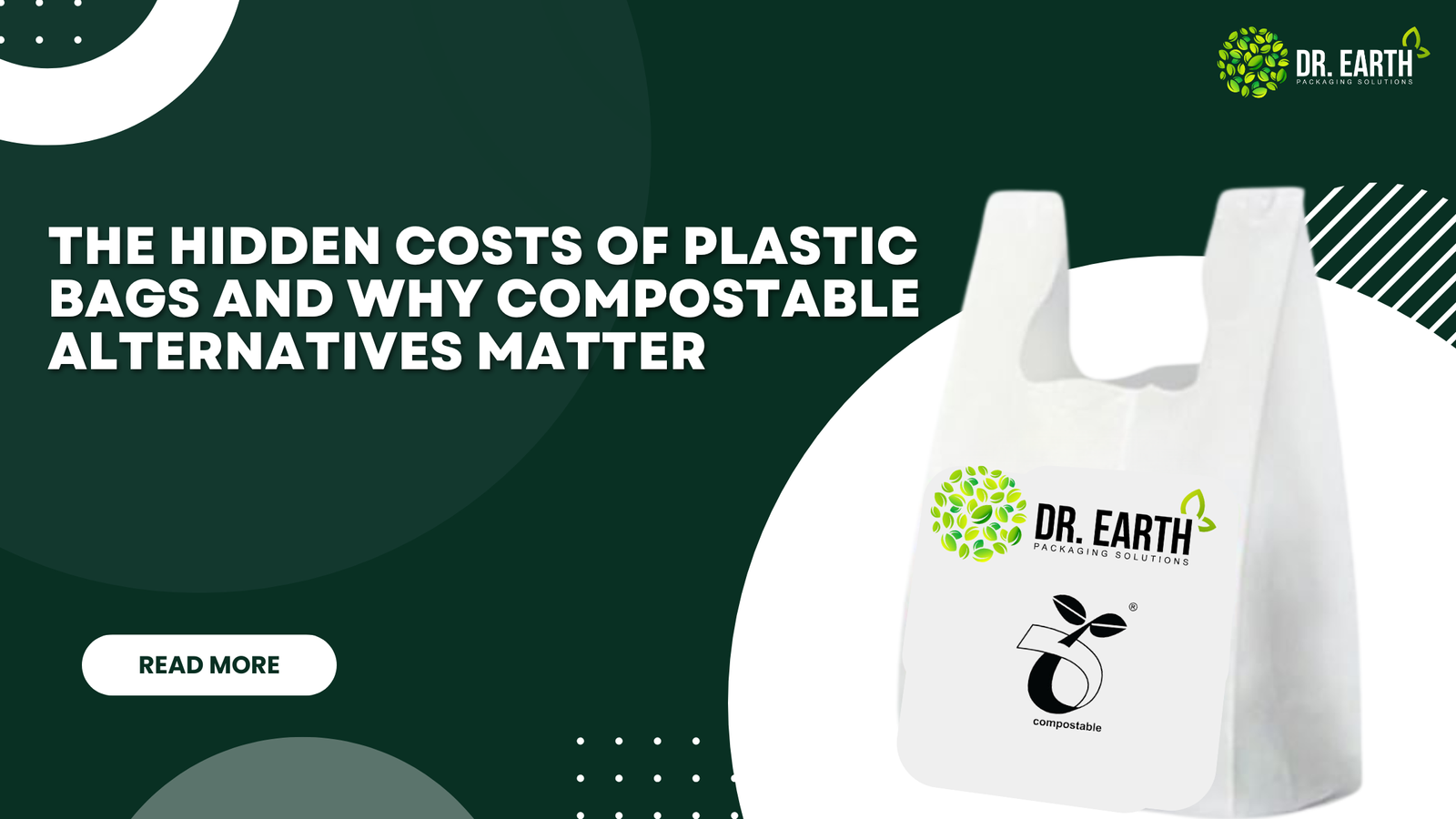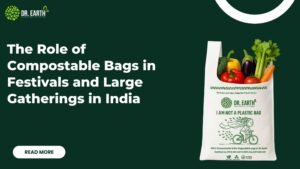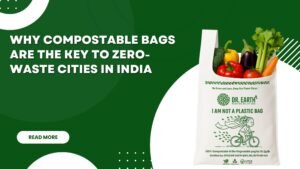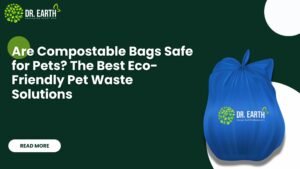
Plastic bags have marked the modern era of convenience products for decades but have costs long beyond the “penny-plus” price tagged to these affordable items. Instead, their environmentally, economically and socially hidden consequences bring with them very long-ranging implications. Compostable alternatives, like high-quality options by Dr. Earth are a viable answer to this burning problem.
Here in this blog post, let us demystify the dark side of plastic bags, understand the advantages of going with compostable bags and why they are the need of today and tomorrow for living a healthier life and building a healthier planet.
The Hidden Environmental Costs of Plastic Bags
1. Pollution and Litter
Plastic bags decompose after approximately 1,000 years. However, they still break down into microplastics, which enter the soil and water and ultimately find their way into the food chain, impacting human and animal health.
2. Non-Biodegradability
Plastic bags take up to 1,000 years to decompose, and once they do, they break into microplastics. These smaller particles pollute the soil and water, entering the food chain where they affect both human and animal health.
3. Resource Depletion
Plastic bags, being derived from non-renewable resources of crude oil and natural gas. The extraction, as well as its production processes, hugely contributes to the carbon emissions into the atmosphere. It also diminishes the naturally finite resources within the earth.
4. Greenhouse Gas Emissions
From production to disposal, plastic bags emit greenhouse gases, which contribute to climate change. Burning plastic waste is the worst, as it emits toxic fumes into the atmosphere.
The Hidden Economic Costs of Plastic Bags
1. Cleanup and Waste Management
Billions are being spent yearly by governments and municipalities to clean plastic waste and keep landfills open. In most cases, this is the cost of the taxpayer.
2. Impact on Tourism and Local Economies
Littering on tourist destinations made of plastic bags defiles the natural attraction; thus, the local economies are likely to feel the blow from less tourism.
3. Harm to Agriculture
Degraded microplastics in the soil result in poor soil fertility, impacting the yield of crops and thus long-term economic problems for farmers.
4. Recycling Inefficiencies
Plastic bags are notorious to recycle since they are often contaminated and very light. Most recycling facilities cannot recycle them, thus making disposal costly.
The Societal Costs of Plastic Bags
1. Public Health Risks
Health Risks: Public Health Microplastics end up in our drinking water and food, meaning consumers are exposed to health risks related to hormonal imbalance and increased risk of cancer.
2. Burden on Future Generations
Legacy for the future generations Plastic is a long-term problem; however, consequences of plastic usage by us will be passed on to future generations.
3. Inequitable Impact
This burden falls upon communities along the routes from landfills or incineration sites, who typically are low-income and marginalized families.
Why Compostable Alternatives Matter
Compostable bags are the best way to deal with the issues raised by plastic bags. Such bags are made of natural, biodegradable sources such as cornstarch. They decompose into organic material under composting conditions, which means they have no toxic residue.
Benefits of Compostable Bags
1. Eco-Friendly Decomposition
Compostable is biodegradable, as it takes months to decompose, creating fertility in soils with little waste in the environment.
2. Reduced Carbon Footprint
Compostable bags consume less fossil fuel and emit fewer carbon gases as compared to plastic bags.
3. Safer for Wildlife
Compostable bags do not destroy wildlife since they decompose before causing any form of harm.
4. Support for Circular Economy
Compostable bags support the principles of a circular economy, in which materials are reused and returned to the earth without causing damage.
5. Positive Brand Image
Grocery stores and e-commerce companies that adopt compostable packaging signal their commitment to sustainability, so they become very popular with conscious consumers.
Dr. Earth: Leading the Compostable Revolution
The company has a reputation for quality compostable bags that are robust, reliable, and sustainable. Here’s why Dr. Earth stands out from the rest:
- Innovative Materials: Produced from cornstarch and other organic materials, these compostable bags are 100% biodegradable.
- Versatility: For grocery shopping, food packaging, and even waste disposal, it is all applicable.
- Certified Quality: It is produced under international standards on compostability so that these can decompose without harming the environment.
- Consumer and Business-Friendly: These are affordable and can be customized according to individual needs or commercial ones.
How to Transition from Plastic to Compostable Bags
For Individuals
- Shop using grocery bags that are compostable and shun single-use plastics.
- Dispose of compostable bags in compost bins for effective decomposition
- Educate relatives and friends on the advantages of compostable alternatives
For Businesses
- Partnership with sustainable suppliers such as Dr. Earth for sourcing compostable packaging
- Compostable bags become part of one’s everyday business, even from packaging up to disposing
- Market transition to attract a more environmentally conscious clientele while improving reputation.
Challenges and Solutions
Challenges
- Higher Initial Expenses: Compostable bags cost more than plastic ones.
- Composting Infrastructure: Many regions do not have composting facilities.
- Awareness of Customers: Most of the people do not know why compostable bags are important or how to dispose them of properly
Solutions
- To promote the usage of sustainable materials, encourage the government to offer subsidies and investment in composting infrastructure.
- Instruct customers to learn about compostable bags’ significance and to properly compost it.
- Scale production to lower the costs and make compostable bags more accessible.
The Way Forward: Embracing Compostable Alternatives
Using compostable bags is more than a trend—it is a necessary action. It mainly calls for change among people and organizations as pollution from plastic bag residues becomes increasingly known and acknowledged.
Dr. Earth is a leader in this motion by producing innovative, sustainable, environmentally friendly solutions to compostable bags. When we make the shift, we can collectively fight the silent cost of plastic bags and produce a clean, healthy, and green future.
FAQs
Q- 1. What are compostable bags made of?
Ans- Compostable bags are derived from natural elements such as cornstarch and PLA, which break down to organic matter through composting.
Q- 2. How do compostable bags benefit the environment?
Ans- Compostable bags decompose quickly, eliminating the possibility of creating microplastic pollution and lessening waste accumulation compared to the traditional plastic bags.
Q- 3. Are compostable bags durable?
Ans- Yes, they are strong and reliable for all uses, including those offered by Dr. Earth.
Q- 4. How should I dispose of compostable bags?
Ans-Dispose of them in a compost bin or facility so that they will decompose properly. Do not put them in regular plastic recycling bins.
Q- 5. Why should businesses switch to compostable bags?
Ans-Compostable bags improve the brand image, fulfill regulatory requirements, and match the customer’s preferences for green products.
Share:
Related Posts














